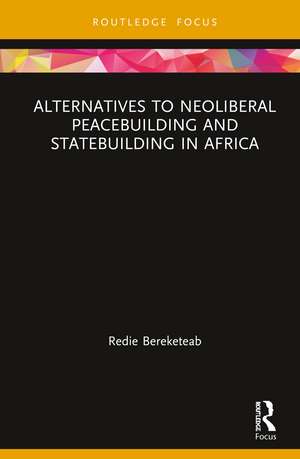Alternatives to Neoliberal Peacebuilding and Statebuilding in Africa: Routledge Studies in African Development
Autor Redie Bereketeaben Limba Engleză Hardback – 3 sep 2020
The neoliberal interventionist model assumed prominence and universal hegemony following the demise of state socialism at the end of the Cold War. However, this book argues that it is a primarily short-term, top-down approach that imposes Western norms and values on conflict and post-conflict societies. By contrast, the popular progressive model espoused by this book is based on stringent examination and analysis of the reality of the socio-economic development, structures, institutions, politics and cultures of developing societies. In doing so, it combines bottom-up and top-down, popular and elite, and long-term evolutionary processes of societal construction as a requisite for enduring peacebuilding and statebuilding.
By comparing and contrasting the dominant neoliberal peacebuilding and statebuilding model with a popular progressive model, the book seeks to empower locals (both elites and masses) to sit in the driver’s seat and construct their own societies. As such, it is an important contribution to scholars, activists, policymakers, civil society organisations, NGOs and all those who are concerned with peace, stability and development across Africa and other developing countries.
| Toate formatele și edițiile | Preț | Express |
|---|---|---|
| Paperback (1) | 124.87 lei 6-8 săpt. | |
| Taylor & Francis – aug 2022 | 124.87 lei 6-8 săpt. | |
| Hardback (1) | 461.84 lei 6-8 săpt. | |
| Taylor & Francis – 3 sep 2020 | 461.84 lei 6-8 săpt. |
Din seria Routledge Studies in African Development
-
 Preț: 348.19 lei
Preț: 348.19 lei -
 Preț: 284.45 lei
Preț: 284.45 lei -
 Preț: 318.10 lei
Preț: 318.10 lei -
 Preț: 238.37 lei
Preț: 238.37 lei - 14%
 Preț: 336.93 lei
Preț: 336.93 lei - 18%
 Preț: 1000.27 lei
Preț: 1000.27 lei -
 Preț: 390.80 lei
Preț: 390.80 lei -
 Preț: 386.00 lei
Preț: 386.00 lei - 18%
 Preț: 934.74 lei
Preț: 934.74 lei - 18%
 Preț: 1000.27 lei
Preț: 1000.27 lei - 18%
 Preț: 891.36 lei
Preț: 891.36 lei -
 Preț: 190.02 lei
Preț: 190.02 lei - 17%
 Preț: 267.77 lei
Preț: 267.77 lei - 9%
 Preț: 869.19 lei
Preț: 869.19 lei -
 Preț: 363.00 lei
Preț: 363.00 lei - 17%
 Preț: 258.50 lei
Preț: 258.50 lei -
 Preț: 443.65 lei
Preț: 443.65 lei -
 Preț: 479.63 lei
Preț: 479.63 lei - 18%
 Preț: 1054.71 lei
Preț: 1054.71 lei -
 Preț: 449.41 lei
Preț: 449.41 lei -
 Preț: 383.30 lei
Preț: 383.30 lei - 18%
 Preț: 1113.32 lei
Preț: 1113.32 lei - 20%
 Preț: 254.45 lei
Preț: 254.45 lei -
 Preț: 463.19 lei
Preț: 463.19 lei - 18%
 Preț: 997.11 lei
Preț: 997.11 lei - 17%
 Preț: 259.10 lei
Preț: 259.10 lei - 18%
 Preț: 1000.27 lei
Preț: 1000.27 lei -
 Preț: 488.29 lei
Preț: 488.29 lei -
 Preț: 186.53 lei
Preț: 186.53 lei - 18%
 Preț: 1000.27 lei
Preț: 1000.27 lei -
 Preț: 442.07 lei
Preț: 442.07 lei
Preț: 461.84 lei
Nou
Puncte Express: 693
Preț estimativ în valută:
88.37€ • 92.27$ • 73.14£
88.37€ • 92.27$ • 73.14£
Carte tipărită la comandă
Livrare economică 05-19 aprilie
Preluare comenzi: 021 569.72.76
Specificații
ISBN-13: 9780367558949
ISBN-10: 0367558947
Pagini: 140
Dimensiuni: 138 x 216 x 13 mm
Greutate: 0.28 kg
Ediția:1
Editura: Taylor & Francis
Colecția Routledge
Seria Routledge Studies in African Development
Locul publicării:Oxford, United Kingdom
ISBN-10: 0367558947
Pagini: 140
Dimensiuni: 138 x 216 x 13 mm
Greutate: 0.28 kg
Ediția:1
Editura: Taylor & Francis
Colecția Routledge
Seria Routledge Studies in African Development
Locul publicării:Oxford, United Kingdom
Public țintă
Postgraduate and Undergraduate AdvancedCuprins
1. Introduction: Understanding Peacebuilding and Statebuilding in the Era of Neoliberalism 2. Neoliberal Peacebuilding and Statebuilding 3. Popular Progressive Peacebuilding and Statebuilding 4. State Emancipation and Societal Pacification as Prerequisites for Peacebuilding 5. Statebuilding and Peacebuilding: harmony and discordance 6. Conclusion: Summary and Highlights
Notă biografică
Redie Bereketeab is Associate Professor of Sociology and Senior Researcher at The Nordic African Institute, Uppsala, Sweden.
Recenzii
"Redie Bereketeab's critical engagement of the perennial challenges of peace-building and state-building, particularly his critique of neoliberal interventionism and introduction of the popular peace-building and state-building perspective is very refreshing and timely. I have nothing but praise for this groundbreaking work." -- Sabelo J. Ndlovu-Gatsheni, Professor and Chair of Epistemologies of the Global South, University of Bayreuth, Germany
"Based on a solid critique of the neoliberal model of peace-building and state-building (PBSB) in Africa, and drawing on informed knowledge of African context, Bereketeab vigorously argues for an alternative to neoliberalism. It is a timely and essential reading at a time Africans are fighting for a bright future amid multiple challenges." -- Atta El-Battahani, Professor of Political Science, Department of Political Science, University of Khartoum, Sudan
"Based on a solid critique of the neoliberal model of peace-building and state-building (PBSB) in Africa, and drawing on informed knowledge of African context, Bereketeab vigorously argues for an alternative to neoliberalism. It is a timely and essential reading at a time Africans are fighting for a bright future amid multiple challenges." -- Atta El-Battahani, Professor of Political Science, Department of Political Science, University of Khartoum, Sudan
Descriere
This book critically interrogates the neoliberal peacebuilding and statebuilding model. An important book for scholars, activists, policymakers, civil society organisations, NGOs concerned with peace, stability and development across Africa and other developing countries.
